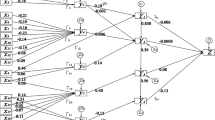Abstract
Over the past few years, the rate of commuters using public transportation has drastically reduced, which has led to a rise in private vehicles with higher levels of traffic congestion, accidents, pollution, etc. The present study aims to identify major significant factors influencing the mode choice decisions of commuters working in Thiruvananthapuram city. The latent attributes influencing the mode choice decision were analysed using the semantic differential technique with a five-point bipolar adjective scale. In order to identify the key latent factors influencing commuters use of public transportation, exploratory factor analysis was conducted. Also, in order to statistically quantify the link between the founded latent variables and the observed variables, confirmatory factor analysis was also carried out. Latent variables integrated mode choice models were developed for different categories of work trips, such as government employees, private employees, and a combined set of employees using multinomial logistic regression. Reliability, convenience, comfort, and safety were identified as latent factors influencing the mode choice behavior of private employees and a combined set of employees. In the case of government employees, travel behavior also depends on their affinity for public transport. Latent variable integrated mode choice models were found to have a relevant role in the mode choice decisions of commuters. Mode choice models reveal that a unit percentage increase in latent variables will result in a considerable increase in the use of public transport services in Thiruvananthapuram city.
Access this chapter
Tax calculation will be finalised at checkout
Purchases are for personal use only
Similar content being viewed by others
References
Alex AP, Saraswathy MV, Isaac KP (2016) Latent variable enriched mode choice model for work activity in multi modal condition prevalent in India. Int J Traffic Transp Eng 6(4):378–389
Alvinsyah, Soehodho S, Nainggolan PJ (2005) Public transport user attitude based on choice model parameter characteristics (case study: Jakarta busway system). J East Asia Soc Transp Stud 6:480–491
Antonucci L, Crocetta C, d’Ovidio FD, Toma E (2012) Passenger satisfaction: a multi-group analysis. Qual Quant 48(1):337–345
Ashalatha R, Manju VS, Zacharaia AB (2013) Mode choice behaviour of commuters in Thiruvananthapuram city. J Transp Eng 139:494–502
Atasoy B, Glerum A, Bierlaire M (2013) Attitudes towards mode choice in Switzerland. disP Plann Rev 49(2):101–117
Chen J, Li S (2017) Mode choice model for public transport with categorized latent variables. Math Probl Eng 2017:1–11
Chen CP, Naylor GA (2011) Development of a mode choice model for bus rapid transit in Santa Clara County, California. J Public Transp 14(3):41–62
Dimitrios P, Luis MM (2015) The role of accessibility and connectivity in mode choice. A structural equation modelling approach. Transp Res Procedia 10:831–839
Kumar M, Sarkar P, Madhu E (2013) Development of fuzzy logic based mode choice model considering various public transport policy options. Int J Traffic Transp Eng 3(4):408–425
Marwa EE, Ibrahim H, Mohamed MS, Mohamed SS (2014) Policy sensitive mode choice analysis of Port-Said City, Egypt. Alex Eng J 53:891–901
Pulugurta S, Arun A, Errampalli M (2013) Use of artificial intelligence for mode choice analysis and comparison with traditional multinomial logit model. Soc Behav Sci 104:583–592
Ravi Sekhar C (2014) Mode choice analysis: the data, the models and future ahead. Int J Traffic Transp Eng 4(3):269–285
Ren G, Fan H (2020) Study on influencing factors of urban short-distance travel mode choice based on structural equation modelling. In: CICTP 2020, pp 3632–3644
Santos G, Maoh H, Potoglou D, von Brunn T (2013) Factors influencing modal split of commuting journeys in medium-size European cities. J Transp Geogr 30:127–137
Author information
Authors and Affiliations
Corresponding author
Editor information
Editors and Affiliations
Rights and permissions
Copyright information
© 2024 The Author(s), under exclusive license to Springer Nature Switzerland AG
About this paper
Cite this paper
Shaheem, S., Radhakrishnan, N., Mathew, S. (2024). Mode Choice Modelling of Different Categories of Work Trips in Thiruvananthapuram City. In: Nehdi, M., Hung, M.K., Venkataramana, K., Antony, J., Kavitha, P.E., Beena B R (eds) Proceedings of SECON’23. SECON 2023. Lecture Notes in Civil Engineering, vol 381. Springer, Cham. https://doi.org/10.1007/978-3-031-39663-2_20
Download citation
DOI: https://doi.org/10.1007/978-3-031-39663-2_20
Published:
Publisher Name: Springer, Cham
Print ISBN: 978-3-031-39662-5
Online ISBN: 978-3-031-39663-2
eBook Packages: EngineeringEngineering (R0)




